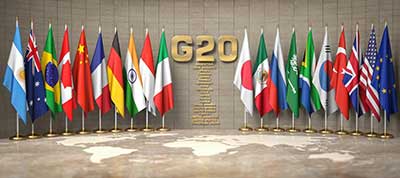Date: 02/01/2023
Relevance: GS-2: Bilateral, Regional, and Global Groupings and Agreements involving India and/or affecting India’s interests.
Key Phrases: G-20 Troika, G20 presidency, continuity in the agenda, Group of Seven, Asian financial crisis, global financial crisis, Leader’s Declaration, post-pandemic recovery, Vasudhaiva Kutumbakam, global recession.
Why in News?
- India has taken over the G20 presidency on the occasion of the country completing 75 years of its independence and becoming the fifth-largest economy in the world.
- India’s assumption of the 18th G20 (Group of Twenty) presidency underpins a new epoch for the grouping.
G-20 Troika:
- The G20 chair is part of a rotating three-member group of immediate past, current, and succeeding presidencies, referred to as the Troika to ensure continuity in the agenda as there is no permanent G20 secretariat.
- For the first time, the ‘Troika’ will be comprised of three emerging market economies – Indonesia, India, and Brazil.
- The G20 summits are convened under a system of rotational presidencies and are selected from a different regional grouping of countries.
The inception of G20: the rise of emerging markets in the multilateral order
- The G20 was conceived in 1999 in the aftermath of the 1997 Asian financial crisis to discuss matters related to international economic and financial stability and align policies among the most significant and relevant industrialized and developing economies.
- Until then, the group of advanced countries– the Group of Seven (G7)– was the main forum that discussed international issues ranging from global financial governance to anti-corruption and terror financing, with the view to build consensus and policy response among developed countries.
- The Asian financial crisis brought to the fore the criticality and centrality of developing countries to maintain the multilateral order owing to their deep integration into the global economic systems and cross-border capital flows.
- Since the immediate context was to mitigate the ill effects of the contagion caused by the Asian financial crisis, the beginning of the G20 (with the addition of 12 economies to the G7 countries) was underpinned by the coming together of their Finance Ministers and central bank governors to discuss how a coordinated response to the emergent crisis and future crises could be made.
Evolution of the G20: Points of Inflection.
- Global financial crisis:
- The first happened in 2008 in the aftermath of the global financial crisis that emerged in the U.S. when the forum was elevated to the summit level with the participation of heads of state or government.
- The initial summits, held in the U.S., the U.K., and Canada focused on developing a coordinated response to the financial crisis and the consequent economic slowdown, including discussions on monetary and fiscal policy measures, preventing a reversion to protectionist policies and reforming of the Bretton Woods institutions.
- Other issues such as strengthening trade and investments were discussed in the larger context of their impact on ensuring financial stability and economic growth.
- Issues like food security which were discussed at the G7 level till then also found their way in the G20 agenda.
- South Korean presidency (2010):
- The next pivotal moment was during the South Korean presidency in 2010 when development issues were introduced as a priority in the G20 agenda.
- In the subsequent years, as the effects of the global financial crisis waned and financial sector stability was restored to an extent, the mandate of the Sherpa Track expanded.
- Many new working groups were added to reflect the widened ambit.
- Successive presidencies — France, Mexico, Russia, Australia, Turkey, and China — focused on various issues reflecting their respective priorities and relevance to the G20 community.
- German presidency (2017):
- In 2017, amidst the U.S.-China trade war and divergence of opinion on multiple issues including climate change, the G20 weathered the storm by following a majority over unanimity.
- For the first time, the G20 recorded a Leader’s Declaration with 19 members supporting the agenda, alongside the dissent of one.
- While failure to build consensus may have set a bad precedent, from a global governance perspective it exemplified the point that no one nation is superior in the grouping.
- The Argentinian and Japanese presidencies also withstood turbulent times and widened the scope of the G20 agenda to reflect on new issues like the future of work, which had gained prominence and cast a long shadow on international policymaking.
Covid-19: Resilience and Recovery
- In 2020, the significance of the G20 was realized one more time when it was held amidst the looming shadow of the COVID-19 pandemic which made a coordinated response a necessity for weathering the storm and recovering with resilience.
- A set of policies and emergency measures were put together by G20 leaders for protecting people and safeguarding the global economy in response to the pandemic.
- The subsequent Italian and Indonesian presidencies continued to focus on the post-pandemic recovery.
Conclusion:
- The scare caused by the current outbreak in China, the prevailing food and energy crisis caused by the raging Russia-Ukraine conflict, the effects of climate change, and the ominous clouds of global recession caused by sticky inflation have made building consensus on a multitude of global issues during the Indian presidency a formidable task.
- Under the apt theme of “Vasudhaiva Kutumbakam” (or “One Earth, One Family, One Future”), India is determined to reinforce the point that the world is one family, and the need for coordinated action has never been so dire.
- In the current milieu of fragilities and opportunities in the multilateral setting, the G20 is perhaps the only inclusive forum that can set the agenda for global peace and harmony.
Source: The Hindu
Mains Question:
Q. “In the current milieu of fragilities and opportunities in the multilateral setting, the G20 may be the only inclusive forum to set the agenda for global peace and harmony.” Examine the statement.






















